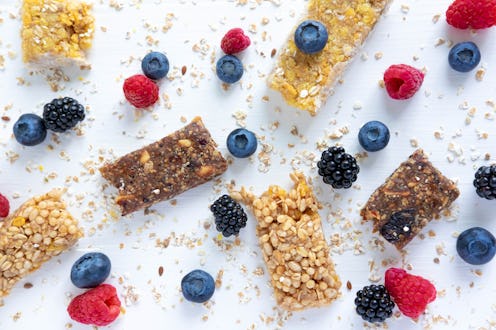Life
Your Summer Smoothie Habit May Need A Rethink, According To Nutritionists

The internet is a glorious thing, but it is also full of misinformation, particularly relating to health. When new wellness trends pop up almost daily, embarking on a healthy diet is made only the more difficult. To debunk some of the online dietary myths, I asked a couple of nutrition experts which "healthy" foods can actually be bad for you. And the results were eye-opening.
"I would be keen to highlight that it’s not helpful to label food as healthy or bad," says Aisling Piggott, registered dietitian and spokesperson for the British Dietetic Association. But some foods, like the ones mentioned below, "are perceived as being more wholesome, but may not necessarily be," she adds.
This can include everything from gluten-free and vegan labels to protein-filled products and even your favourite hot weather beverage. As the experts point out, the following foods aren't always unhealthy. But the rising number of companies looking to profit off wellness lifestyles means you need to be extra vigilant when looking for high-quality choices.
I suppose the biggest piece of advice is: take marketing claims with a pinch of salt. Oh, and consider making things at home versus opting for store-bought items.
Here's five foods and drinks to dig deeper into before consuming in the future.
1Veggie Crisps
Nutritionist Jenna Hope notes that "really good crisps which are essentially dried vegetables" do exist, but, she adds, "there are plenty on the market now which are heavily processed corn chips with a few percent vegetable extract."
According to Hope, the "highly processed" nature of these products means that a lot of the fibre can be removed. Salt content can also be high, potentially leading to an increase in "your desire for more food."
2Gluten-Free & Vegan Foods
"Gluten-free and vegan options are amazing for choice and allow those on a gluten-free or vegan diet to have lots of options," says Piggott. But the idea that they automatically fall into the health food category is misguided. "They are just food and need to be considered in terms of health just like any food!" she adds.
And a 2017 study published in The BMJ, which found that restricting gluten could result in a lower intake of heart-boosting whole grains, backs Piggot's point. In fact, researchers stated that gluten-free diets should not be overly promoted for people without coeliac disease.
3Juice & Smoothies
"These generally are rich in vitamins and minerals," notes Piggott. However, the recommended daily portion size is 150ml. As the Independent states, a lot of smoothie brands sell products in 250ml portions. Piggott says this means "excessive energy and sugar can be consumed without realising."
A real bummer for any smoothie lovers. But if you want to continue your juice habit, just cut back on the amount you're drinking. And if you're wondering exactly how big 150ml is, it's only a small glass.
4Cereal & Protein Bars
These are commonly consumed by people who need a quick energy fix, but it's advisable to check the ingredients list of any you buy. Many cereal bars "have plenty of added sugars [and] fruit purees and may be higher in fat," says Piggott.
Bars claiming to be full of protein are similarly problematic. A 2017 Mintel report found that 27 percent of Brits used sport nutrition products like protein bars or shakes. "The term 'protein' has taken the nation by storm and nowadays people are attempting to pack it into everything," states Hope. "Whilst protein is a vital component of the diet, this isn’t a case of the more the merrier."
Too much protein, she explains, can result in kidney stress. (As the BBC reports, evidence of this in healthy people is "minimal" but issues may arise in people with pre-existing kidney problems.) And protein bars are often "loaded with artificial sweeteners which may stimulate appetite and alter gut bacteria." More research is needed in this area, Hope admits, but she recommends getting your protein intake from whole food sources like meat, fish, eggs, nuts, and beans.
5Ginger Shots
This may sound like a niche food, but ginger has become a big health trend over the past couple of years. In January 2018, research company Mintel described it as "the leading ingredient in juice shot innovation." And, as Healthline reports, ginger does have anti-inflammatory and antioxidant properties.
Watch out where you get your shots from, though, advises Hope. Homemade versions "can provide some benefits, although these alone won't revolutionise your health," but pre-made formulas can result in a higher sugar intake as "the chances are you're buying 60 percent-plus apple juice."
6
If you enjoy any of the above, you don't have to give them up completely. Instead, research ingredients and consume in moderation.